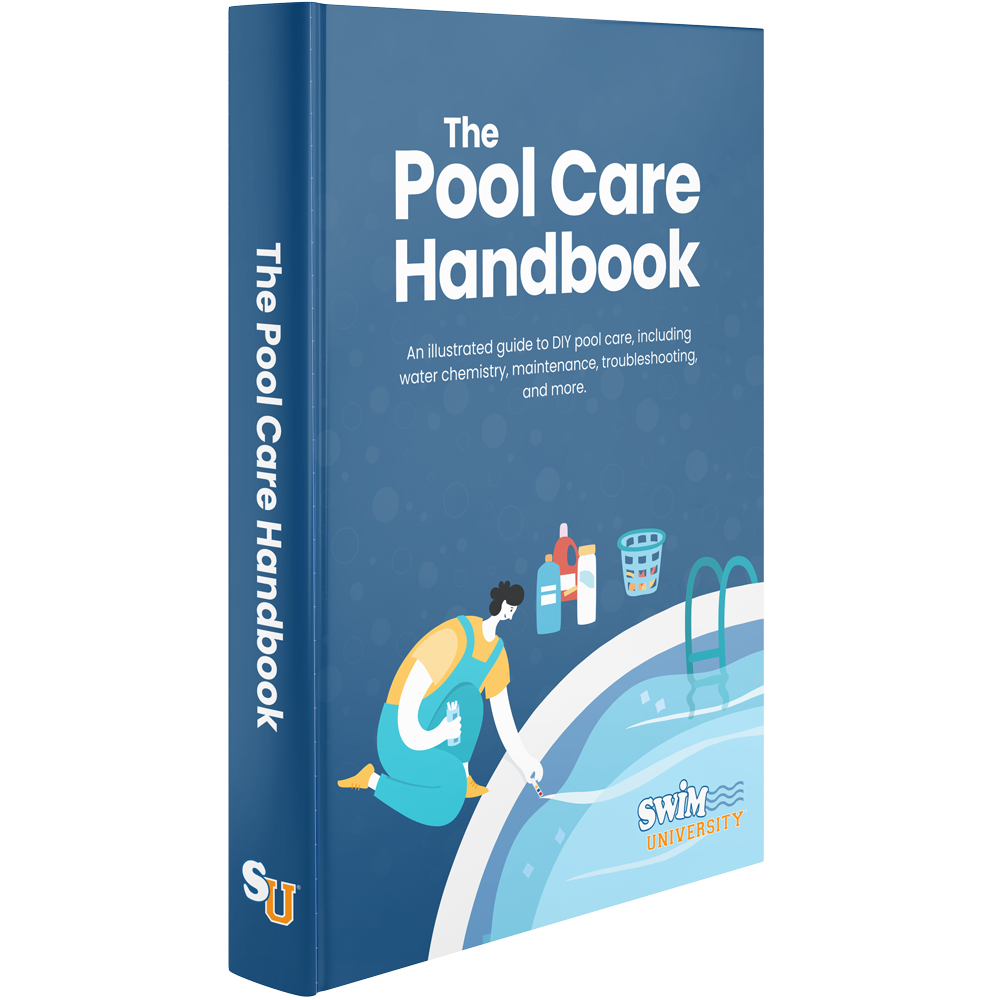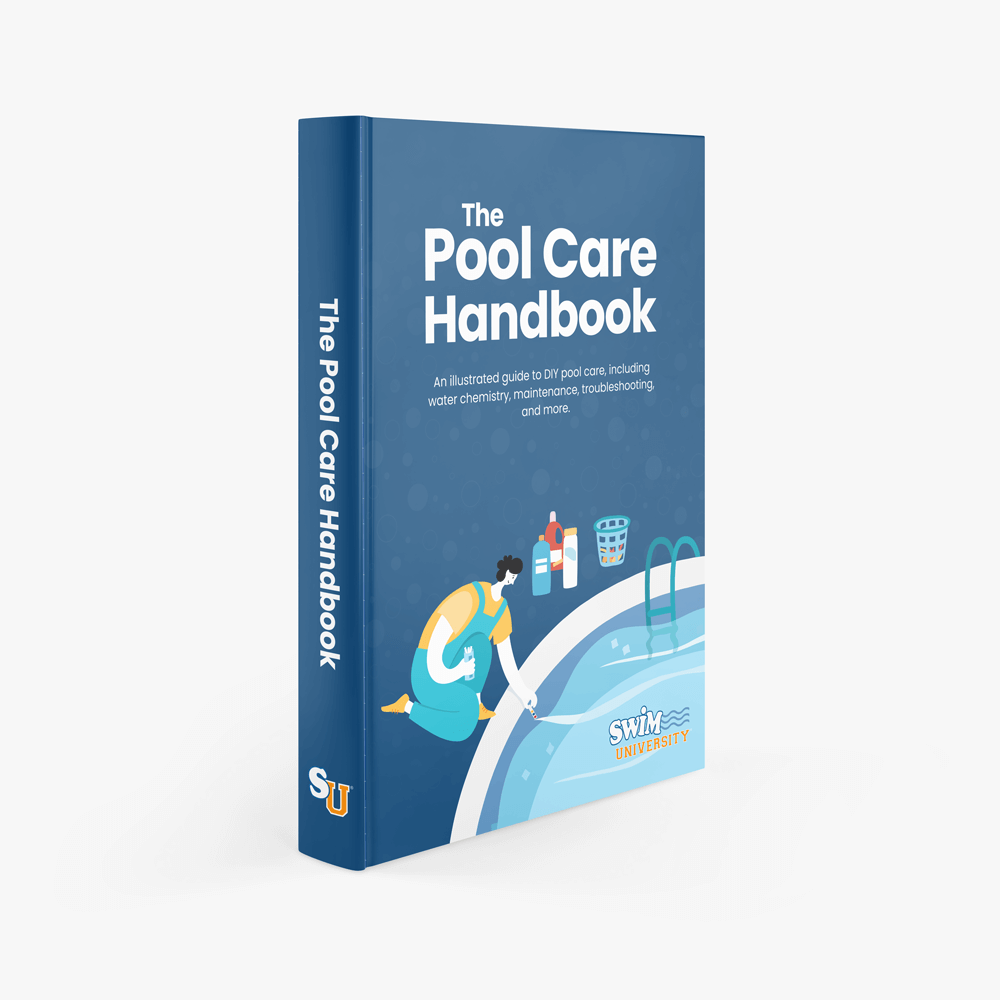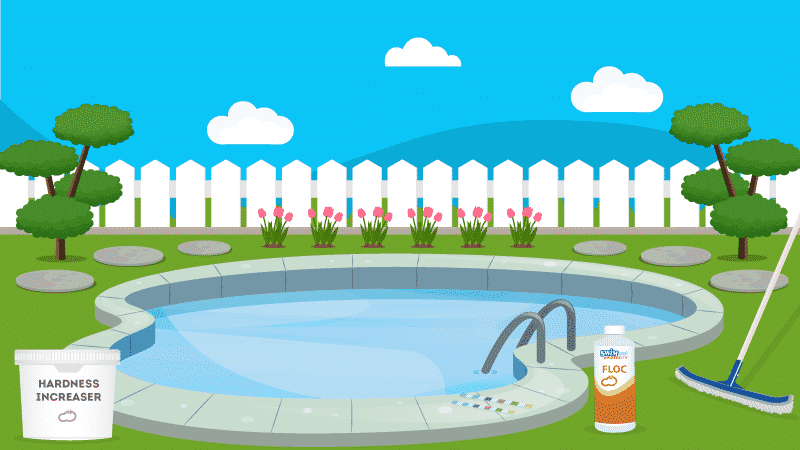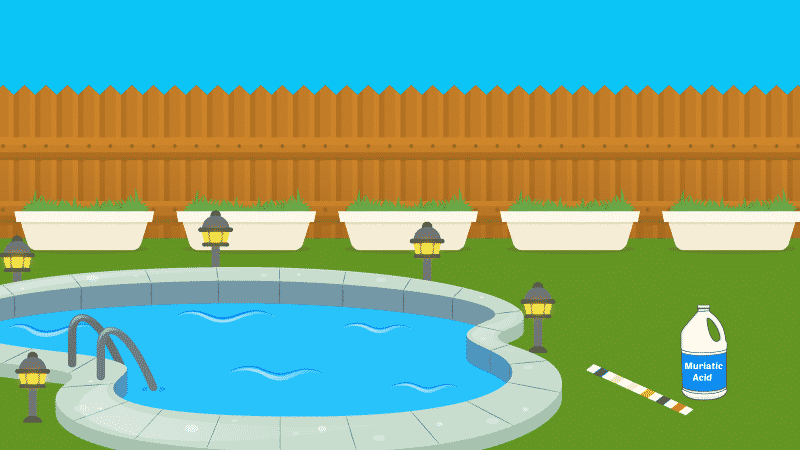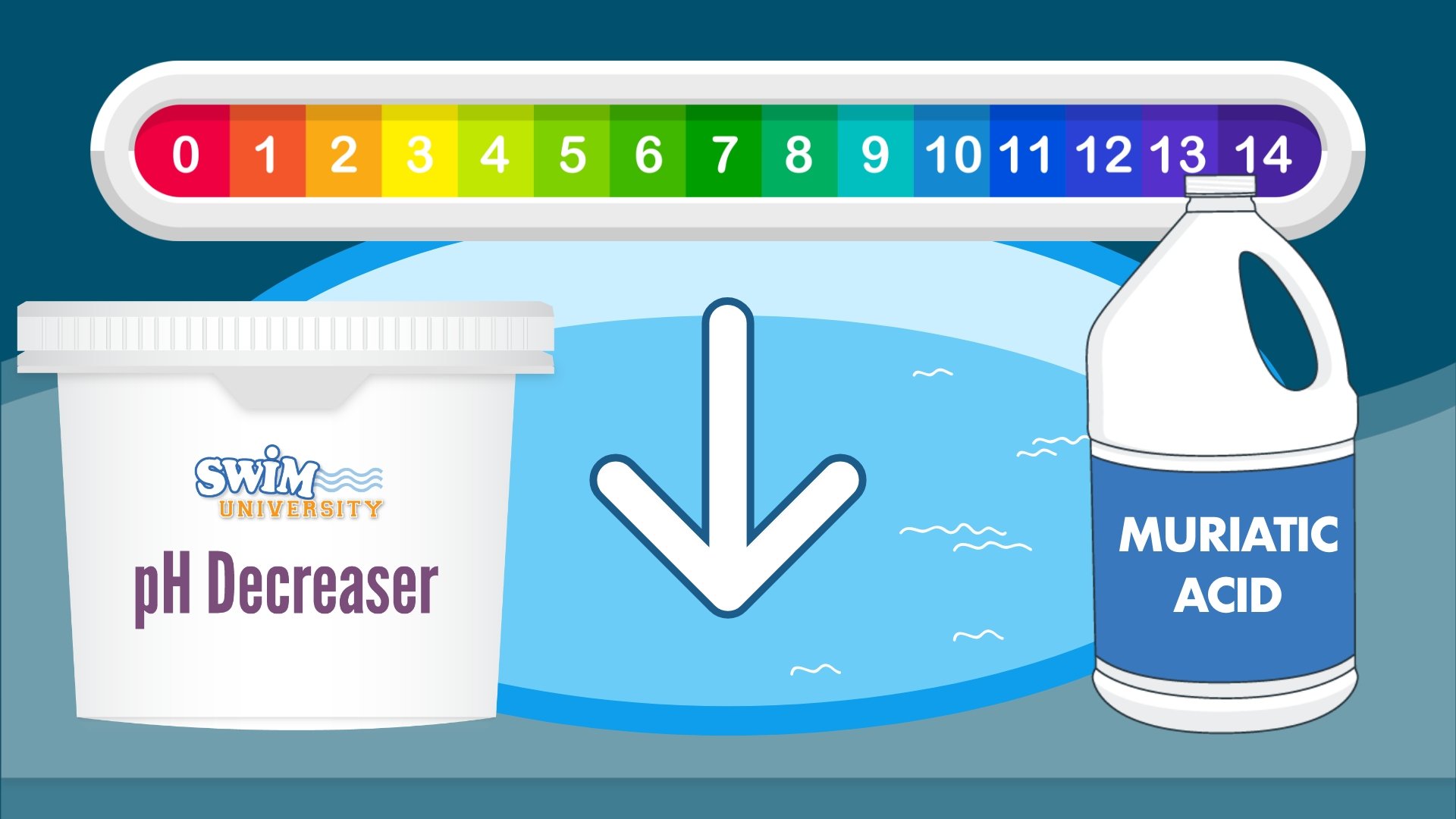How To Raise The pH Level In Your Pool: The Easy Way
Pool water is a delicate balance of chemicals. If the pH in your pool drops below 7, it can cause serious damage to your pool’s surface as well as chlorine loss.
This article will give you a step-by-step guide on how to raise ph in your pool with three inexpensive solutions: Soda ash, baking soda, or pH increaser.
This is the ultimate guide to keeping your pool sparkling clean throughout the year that contains everything you need to know about taking care of your pool the right way. Including saltwater pools.
How to Test Your Pool’s pH Level
You can test your pool water with strips, a liquid test kit, or an electronic meter. No matter how you plan to test your pool water, make sure to take a sample using a clean bottle. Avoid pulling a sample near skimmers and return jets. Ideally, you want to grab a sample from the middle of your pool.
Test The pH Using Strips
Strips are the easiest to use but tend to be the most inaccurate. I still rather use test strips than not testing at all. They’re also pretty cheap. So if testing is a pain for you, then use test strips.
I like test strips that test for pH, Alkalinity, Chlorine, CYA, and Calcium Hardness.
Tests for 7 important chemistries in seconds: Total Hardness, Total Chlorine, Total Bromine, Free Chlorine, pH, Total Alkalinity, and Cyanuric Acid.
Test The pH Using a Liquid Test Kit
A liquid test kit is a lot more accurate but requires a little more work. You have to pull a sample of water and add a few drops of liquid. Then match up the color to the correct pH level. Just follow the directions on the liquid test kit.
This complete water testing kit helps keep your pool or hot tub clean and safe to swim in, with easy-to-follow color instructions and all the supplies you need in one box.
Test The pH Using a Digital pH Meter
A digital pH meter is a little more expensive but it’s worth the investment. A digital pH meter requires you to put your probe in water and press one button to get instant results of your pool’s pH levels.
To use a digital pH meter, you have to calibrate the device with some liquid or buffer solution. The calibration instructions will be included in the package for your specific model of digital pH meter.
After calibration is complete, just dip your probe into a clean sample of pool water and wait until it gets an accurate reading on the screen!
This digital pool and hot tub water test kit checks for Free Chlorine, Total Chlorine, Bromine, PH, Alkalinity, Calcium Hardness, and Cyanuric Acid.
How to Raise Your Pool’s pH Level with the Right Chemicals
For balanced pool water, keep the pH between pH of 7.4-7.6. And there are two different chemicals you can use to raise the pH in your pool:
- Baking Soda aka sodium bicarbonate (sold as Alkalinity Increaser in pool stores).
- Soda Ash aka sodium carbonate (sold as pH Increaser in pool stores).
Note: Before you add any chemicals to your pool, make sure you know exactly how much water your pool holds so you add the correct amount of chemicals to raise your pH and other levels.
Click which type of pool you have to start the calculator below.
 Rectangle
Rectangle
 Round
Round
If you decide to use baking soda, just note that this chemical will also increase your alkalinity level. So if both your pH and alkalinity are low, this is the right chemical to use to raise each one.
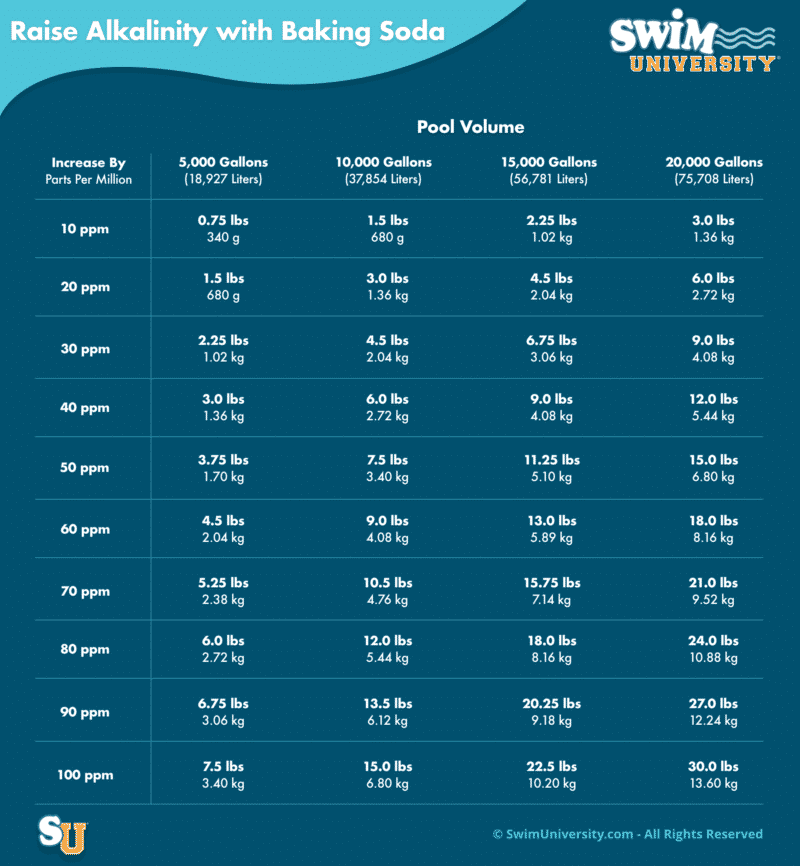
An affordable alternative to traditional chemicals, baking soda will naturally raise the alkalinity and pH in your water. It's also useful for cleaning tiles and surfaces.
But if you just want to raise your pH level, then you should use soda ash.
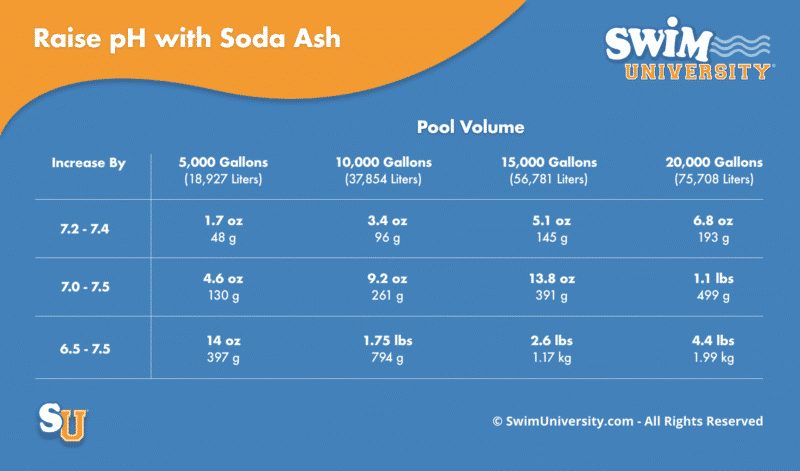
This is the main chemical used to increase your pool's pH. So instead of using a branded version of pH Increaser, you can just use soda ash.
How to Add The Right Chemicals to Raise your Pool’s pH Level
Thankfully, adding baking soda and soda ash is really easy.
- Make sure your pump and filter are running so that the chemical is mixed into the pool water properly.
- Add a small amount of the chemical right into the pool. Be sure to spread it around as much as possible and don’t add too much all at once.
- Let the chemical dissolve into the pool and circulate before adding more.
The act of adding any powder directly to the pool water surface is called broadcasting. You’re broadcasting the chemical around your pool.
It takes about 20 minutes after stirring to see results. Check out how much baking soda or sodium carbonate (soda ash) is required based on your pool’s current readings!
Why Your Pool pH Balance Is Important
If your pool’s pH balance is off, there are some very specific causes and effects. Low ph levels in a pool may lead to:
- Erosion of the metal liner or concrete walls (pools with plaster linings) from acid corrosion
- Reduction in the effectiveness of disinfectants like chlorine or bromine.
- Excessive growth of algae and bacteria in your pool.
Here’s a pH chart that shows how acidic or basic the scale represents.
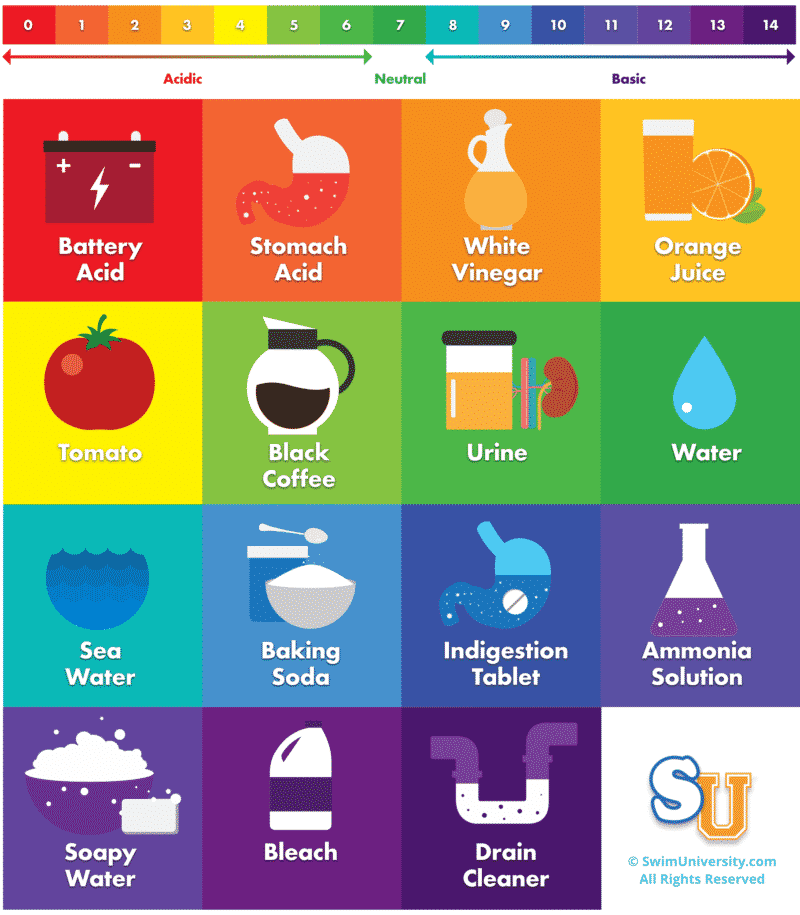
Overall, having balanced pool water (perfect pH and alkalinity levels) helps keep your pool clear and also makes your sanitizer work better. And if your water is too acidic (low pH) it’ll corrode pool equipment and wear down the liner, requiring more frequent replacements.
Do Your Eyes Burn In Your Pool?
Good pool water pH is better for your health! A pH level of 7.5 is close to that of the human eye and mucous membranes. When the pH is high or low, it can cause itchy, irritated eyes and skin.
What Causes Low pH Levels
Mostly low pH levels come from natural factors like rain. The natural pH of rainwater is about 5. So after a heavy rainstorm, it’s normal for your pool to have a lower pH. It’s a good idea to test and rebalance after each storm.
Low pH can also happen after a large party or just having a ton of people in your pool in a short period of time. The more people in your pool, the lower the pH will go. This is caused by dissolved bodily fluids. Gross, I know.
Balanced Water is the Key to a Clean and Clear Swimming Pool
All pools need to be tested and balanced on a regular basis with basic pool chemistry. The key is understanding the pool’s pH level, which will determine how acidic or basic your water is. If you know what balance of chemicals your pool needs for proper maintenance then all you have to do is follow our quick tips for maintaining it!
This includes keeping an eye on the chlorine levels as well as adding in the right amount of algaecide or shock treatment each week.
For those who want more information about how to keep their pool clear and healthy without too much effort, we recommend downloading this helpful cheat sheet that highlights our top 10 best practices for maintaining your swimming area with ease!
Happy Swimming!
4 Ways We Can Help With Your Pool
- Pool Care Cheat Sheets (Free): Easy-to-use downloadable guides to help you keep track of taking care of your pool this year.
- The Pool Care Handbook: An illustrated guide to DIY pool care, including water chemistry, maintenance, troubleshooting, and more.
- The Pool Care Video Course: You’ll get 30+ step-by-step videos and a downloadable guide with everything you need to know about pool maintenance.
- The Pool Care App: Enter your water test results. Get a custom treatment plan. Know exactly what chemicals to add to keep your pool clear.

